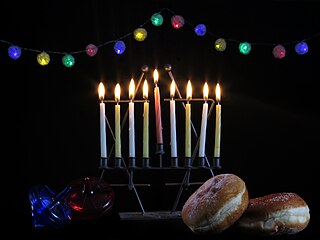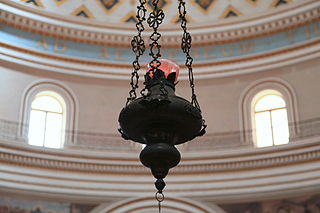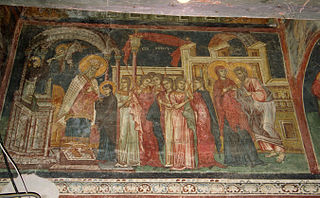Dedication of churches
This article is written like a personal reflection, personal essay, or argumentative essay that states a Wikipedia editor's personal feelings or presents an original argument about a topic.(July 2023) |
Dedication is a ceremony to mark the official completion or opening of something. [1] [2] Such rituals include ceremonial ship launching and a variety of events for buildings including builders' rites or an opening ceremony. Many religions have specific dedication rituals, which serve to consecrate items, places, or people to sacred purpose, such as the dedication of churches or Child dedication.
The Feast of Dedication, today Hanukkah, once also called the "Feast of the Maccabees", is a Jewish festival observed for eight days from the 25th of Kislev (usually in December, but occasionally late November, due to the lunisolar calendar). It was instituted in the year 165 B.C. by Judas Maccabeus, his brothers, and the elders of the congregation of Israel in commemoration of the reconsecration of the Jewish Temple in Jerusalem, and especially of the altar of burnt offerings, after they had been desecrated during the persecution under Antiochus Epiphanes (168 BC). The significant happenings of the festival were the illumination of houses and synagogues, a custom probably taken over from the Feast of Tabernacles, and the recitation of Psalm 30:1–12. [3] According to the Second Book of Chronicles, the dedication of Solomon's Temple took place in the week before the Feast of Tabernacles. [4] Julius Wellhausen suggests that the feast was originally connected with the winter solstice, and only afterwards with the events narrated in Maccabees. [5]
The Feast of Dedication is also mentioned in John 10:22, where the writer mentions Jesus being at the Jerusalem Temple during "the Feast of Dedication" and further notes "and it was winter". The Greek term used in John is "the renewals" (Greek τὰ ἐγκαίνια, ta enkainia). [6] Josephus refers to the festival in Greek simply as "lights". [7]
This article is written like a personal reflection, personal essay, or argumentative essay that states a Wikipedia editor's personal feelings or presents an original argument about a topic.(July 2023) |
A child dedication ceremony takes place in some Christian churches that practice adult baptism. The child is presented to the congregation, and vows are made to raise him or her in the Christian tradition (similar to an infant baptism ceremony), but the child is not baptised, as some churches only accept adult or "believers" baptism. [8]
Some denominations offer a dedication for a marriage or relationship. A service of dedication is used in the Church of England to bless a couple after a civil marriage. [9] The Church of England's Diocese of Hereford "voted to support a motion calling on the House of Bishops to 'commend an Order of Prayer and Dedication after the registration of a civil partnership or a same sex marriage '". [10] [11] Individual Anglican congregations in England may already offer same-sex couples "a special service of prayer and dedication". [12]

Hanukkah is a Jewish festival commemorating the recovery of Jerusalem and subsequent rededication of the Second Temple at the beginning of the Maccabean Revolt against the Seleucid Empire in the 2nd century BCE.

The menorah is a seven-branched candelabrum that is described in the Hebrew Bible and in later ancient sources as having been used in the Tabernacle and in the Temple in Jerusalem. Into prehistory, its iconography can be traced to representations of the sacred tree. Since ancient times, it has served as a symbol representing the Jewish people and Judaism in both the Land of Israel and the Diaspora. It eventually became the State of Israel's official emblem after its founding in 1948.

Sukkot is a Torah-commanded holiday celebrated for seven days, beginning on the 15th day of the month of Tishrei. It is one of the Three Pilgrimage Festivals on which those Israelites who could were commanded to make a pilgrimage to the Temple in Jerusalem. In addition to its harvest roots, the holiday also holds spiritual importance with regard to its abandonment of materialism to focus on nationhood, spirituality, and hospitality, this principle underlying the construction of a temporary, almost nomadic, structure of a sukkah.

Pentecost is a Christian holiday which takes place on the 50th day after Easter Sunday. It commemorates the descent of the Holy Spirit upon the Virgin Mary and the Apostles of Jesus Christ while they were in Jerusalem celebrating the Feast of Weeks, as described in the Acts of the Apostles.
Shemini Atzeret is a Jewish holiday. It is celebrated on the 22nd day of the Hebrew month of Tishrei in the Land of Israel, and on the 22nd and 23rd outside the Land, usually coinciding with late September or early October. It directly follows the Jewish festival of Sukkot which is celebrated for seven days, and thus Shemini Atzeret is literally the eighth day. It is a separate—yet connected—holy day devoted to the spiritual aspects of the festival of Sukkot. Part of its duality as a holy day is that it is simultaneously considered to be both connected to Sukkot and also a separate festival in its own right.

The Maccabees, also spelled Machabees, were a group of Jewish rebel warriors who took control of Judea, which at the time was part of the Seleucid Empire. They founded the Hasmonean dynasty, which ruled from 167 to 37 BCE, being a fully independent kingdom from 104 to 63 BCE. They reasserted the Jewish religion, expanded the boundaries of Judea by conquest, and reduced the influence of Hellenism and Hellenistic Judaism.

In Christian denominations that practice infant baptism, confirmation is seen as the sealing of the covenant created in baptism. Those being confirmed are known as confirmands. For adults, it is an affirmation of belief. It involves laying on of hands.

A sanctuary lamp, chancel lamp, altar lamp, everlasting light, or eternal flame is a light that shines before the altar of sanctuaries in many Jewish and Christian places of worship. Prescribed in Exodus 27:20-21 of the Torah, this icon has taken on different meanings in each of the religions that have adopted it. The passage, which refers to prescriptions for the tabernacle, states:
And thou shalt command the children of Israel, that they bring thee pure oil olive beaten for the light, to cause the lamp to burn always. In the tabernacle of the congregation without the veil, which is before the testimony, Aaron and his sons shall order it from evening to morning before the LORD: it shall be a statute for ever unto their generations on the behalf of the children of Israel. (KJV)
2 Maccabees, also known as the Second Book of Maccabees, Second Maccabees, and abbreviated as 2 Macc., is a deuterocanonical book which recounts the persecution of Jews under King Antiochus IV Epiphanes and the Maccabean Revolt against him. It concludes with the defeat of the Seleucid Empire general Nicanor in 161 BC by Judas Maccabeus, the leader of the Maccabees.

Genuflection or genuflexion is the act of bending a knee to the ground, as distinguished from kneeling which more strictly involves both knees. From early times, it has been a gesture of deep respect for a superior. Today, the gesture is common in the Christian religious practices of the Anglicanism, Lutheranism, the Catholic Church, and Western Rite Orthodoxy. The Latin word genuflectio, from which the English word is derived, originally meant kneeling with both knees rather than the rapid dropping to one knee and immediately rising that became customary in Western Europe in the Middle Ages. It is often referred to as "going down on one knee" or "bowing the knee". In Western culture, one genuflects on the left knee to a human dignitary, whether ecclesiastical or civil, while, in Christian churches and chapels, one genuflects on the right knee when the Sacrament is not exposed but in a tabernacle or veiled.

The Presentation of Jesus is an early episode in the life of Jesus Christ, describing his presentation at the Temple in Jerusalem. It is celebrated by many churches 40 days after Christmas on Candlemas, or the "Feast of the Presentation of Jesus". The episode is described in chapter 2 of the Gospel of Luke in the New Testament. Within the account, "Luke's narration of the Presentation in the Temple combines the purification rite with the Jewish ceremony of the redemption of the firstborn ."

The Presentation of the Blessed Virgin Mary, known in the East as The Entry of the Most Holy Theotokos into the Temple, is a liturgical feast celebrated on November 21 by the Catholic, Eastern Orthodox, and some Anglo-Catholic Churches.

Mattathias ben Johanan was a Kohen who helped spark the Maccabean Revolt against the Hellenistic Seleucid Empire. Mattathias's story is related in the deuterocanonical book of 1 Maccabees. Mattathias is accorded a central role in the story of Hanukkah and, as a result, is named in the Al HaNissim prayer Jews add to the Birkat Hamazon and the Amidah during the festival's eight days.

In Christian tradition the churching of women, also known as thanksgiving for the birth or adoption of a child, is the ceremony wherein a blessing is given to mothers after recovery from childbirth. The ceremony includes thanksgiving for the woman's survival of childbirth, and is performed even when the child is stillborn, or has died unbaptized.

The ceremonial use of lights occurs in liturgies of various Christian Churches, as well as in Jewish, Zoroastrian, and Hindu rites and customs.

John 10 is the tenth chapter of the Gospel of John in the New Testament of the Christian Bible. The author of the book containing this chapter is anonymous, but early Christian tradition uniformly affirmed that John composed this Gospel. This chapter records Jesus' description of himself as the "door of the sheep" and the "Good Shepherd", and contains the only mention of Hanukkah, "the Feast of Dedication", in the New Testament.

Megillat Antiochus recounts the story of Hanukkah and the history of the victory of the Maccabees over the hellenistic Seleucid Empire.
Johanan or John Gaddi was the oldest of the sons of Mattathias, and brother of Judas Maccabeus. He was one of the leaders of the revolt of the Maccabees in the 2nd century BC.

Miracle of the cruse of oil, or the Miracle of Hanukkah, is an Aggadah depicted in the Babylonian Talmud as one of the reasons for Hanukkah. In the story, the miracle occurred after the liberation of the Temple in Jerusalem during the Maccabean Revolt, and it describes the finding of a jug of pure oil that was to be enough to light the lamp for one day, but that lasted for eight days.
Dedication of churches is a dedication ceremony of a church building. Churches under the authority of a bishop are usually dedicated by the bishop.